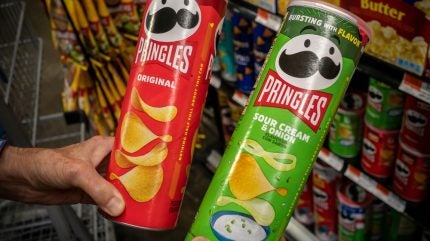
Mars’ takeover of Kellanova could be approved and sealed before Christmas as the European regulator sets a new deadline to complete its investigation into the deal.
The European Commission (EC) suspended its probe in July, announcing it had not received information it had requested as part of its assessment of the transaction.

Discover B2B Marketing That Performs
Combine business intelligence and editorial excellence to reach engaged professionals across 36 leading media platforms.
As a consequence, a 31 October deadline for the regulator to complete its investigation – launched in June following the announcement of the merger in August 2024 – was cancelled.
Now it is back on, with the EC setting a new provisional deadline of 19 December. The October suspension ended on 15 September, suggesting the missing information to sign off the deal has now been received.
A spokesperson for the EC regulator told Just Food in July, citing general procedures, that “once the missing information is supplied by the parties, the clock is re-started and the legal deadline for the Commission’s decision is then adjusted accordingly”.
Approval in the EU is the remaining roadblock after the US antitrust regulator – the Federal Trade Commission – signed off on the merger in June.

US Tariffs are shifting - will you react or anticipate?
Don’t let policy changes catch you off guard. Stay proactive with real-time data and expert analysis.
By GlobalDataThe preliminary findings from the competition body of the EC, the EU’s executive arm, were that “the transaction could lead to higher prices for consumers due to Mars’ increased negotiating power towards retailers in the European Economic Area (EEA)”.
Mars, the privately-owned US snacks and confectionery giant, confirmed the purchase of the Pringles and Cheez-It maker last year for $35.9bn.
When the full EC investigation was launched in June, Mars said it was “disappointed but optimistic” over the outcome of the probe decision.
At the time, Mars told Just Food it expected the transaction to close “towards the end of 2025”, adding: “We are disappointed yet remain optimistic that this investigation will be positively resolved. We have cooperated with the regulatory authorities, furnishing substantial supporting information and will continue to do so.”
In June, the EC said its “preliminary investigation indicates that, by enlarging its product portfolio with the addition of Kellanova’s very popular brands, Mars could increase its bargaining power vis-à-vis retailers”.
It added Mars could then be in a “position to use this increased leverage to, for example, extract higher prices during negotiations, which in turn would lead to higher prices for consumers”.
In the EEA, which includes all the EU trading bloc members, along with Iceland, Liechtenstein and Norway, the EC said “several retailers” had expressed concerns about the deal.
Mars’ deal for Kellanova, formerly part of Kellogg before a demerger of the business in 2023, is one of the largest the packaged foods industry has seen in recent times, rivalling the 2015 merger of Kraft Foods and HJ Heinz.
The now Kraft Heinz is itself in the throes of being unravelled following the announcement of a split earlier in September. The business separation is not, however, due to be completed until late next year.
The merger of Mars and Kellanova would create a business with annual sales revenue of at least $60bn. It surpasses the $23bn Mars paid for the Wrigley’s chewing gum business in 2008, which was supported by Warren Buffett’s Berkshire Hathaway, before the billionaire investor was bought out in 2016.
Buffett, via Berkshire Hathaway, is also the largest shareholder in Kraft Heinz.
Meanwhile, the other half of the Kellogg spin-off – WK Kellogg – is in the midst of a $3.1bn takeover by another European confectionery giant, Italy-headquartered Ferrero. That deal, announced in June, will also be the subject of competition clearance.


